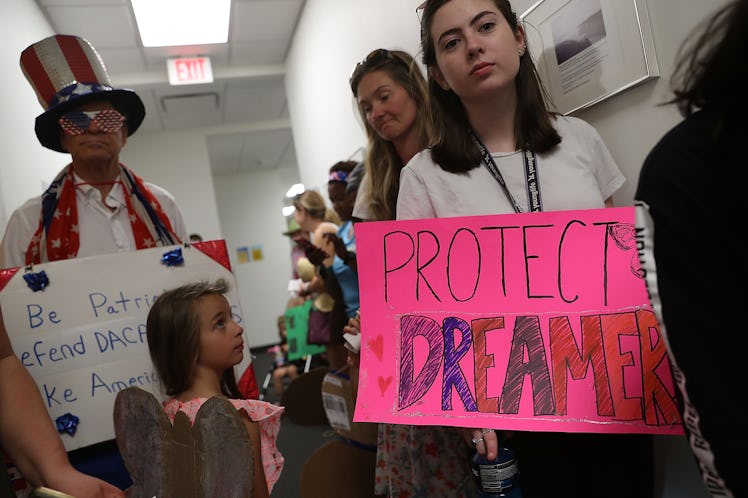
The Supreme Court's DACA Decision Is Good News For Dreamers
On Monday, Feb. 26, the United States Supreme Court issued a game-changing decision regarding the Deferred Action for Childhood Arrivals (DACA) program. The program was scheduled to cease on March 5, a deadline set by President Donald Trump and his administration. But after the Supreme Court's decision, the question of when the DACA deadline is taking effect has been raised anew.
DACA allows some 700,000 young immigrants who arrived in the U.S. as children the right to live and work in the country without being deported. The protected status covers beneficiaries for renewable two-year increments. In September 2017, Trump had signaled his intention to eliminate the program, spurring massive backlash from Capitol Hill to Main Street. Amidst nationwide protests, the president allowed Congress a six-month window in which to tackle the issue, ideally to reach an agreement on what will happen to "Dreamers" and the mammoth topic of immigration at large.
That six-month deadline would have expired on March 5, 2018. But after multiple decisions by judges around the country, the deadline is more symbolic than practical for eliminating the program. What's ahead for the program in the long-term, though, remains to be seen.
Two injunctions by federal judges, in January and February 2018, have temporarily blocked the president from ending the program.
The first, a Jan. 9 decision by San Francisco Judge William Alsup, went in favor of DACA defenders, rejecting Attorney General Jeff Sessions' claim that the program was implemented without the appropriate legal standards. The second block to the Trump administration was made by Brooklyn Judge Nicholas Garaufis on Feb. 13.
In response to the Jan. 9 ruling, the Justice Department motioned that it would seek an appeal with the Ninth Circuit Court, per NBC. But in an unusual move, the Trump administration also requested, prior to any decision by the court of appeals, that in addition to its Ninth Circuit case, the Supreme Court agree to hear an appeal.
In Monday's decision, the Supreme Court denied this request by the Trump administration to hear an appeal over whether it has the discretion to determine the program's fate. As The New York Times points out, because this request was made in advance of any ruling, it's not a surprise that the Supreme Court denied it.
In an order, the Supreme Court wrote that it would leave the case up to the appeals court to decide, expecting the court to "proceed expeditiously" in hearing it.
In a tweet, New York Attorney General Eric Schneiderman described the Trump administration's request to the Supreme Court as an "effort to circumvent the usual judicial process."
In a formal statement released Monday, Schneiderman said, "This is a win for the 42,000 New York Dreamers and over 700,000 Dreamers across the country, and for the millions of families, businesses, hospitals, and universities that depend on Dreamers every single day."
However, he adds, the Supreme Court's rejection doesn't mean the battle is over. Still needed is a permanent solution "to preserve DACA and protect Dreamers."
"It would have been HIGHLY unusual for #SCOTUS to take the CA #DACA cases now," tweeted Karen Tumlin, legal director for the National Immigration Law Center. "The High Court has done that only about a handful of times in the last century."
The Trump administration did not appear to be pleased with the Supreme Court ruling. "The DACA program — which provides work permits and myriad government benefits to illegal immigrants en masse — is clearly unlawful," said the White House in a statement, according to NBC. "We look forward to having this case expeditiously heard by the appeals court and, if necessary, the Supreme Court, where we fully expect to prevail."
So, what does it mean for DACA?
The Jan. 9 injunction meant that, until further rulings were made about the program, the Department of Homeland Security (DHS) had to continue accepting renewal applications for the program. However, the U.S. would not be required to allow back any beneficiaries who had left the country.
According to Schneiderman, this decision also means that those injunctions will continue to be honored — so the DHS' requirement to continue accepting renewal applications past the original March deadline will proceed.
As Reuters' Lawrence Hurley notes, the two injunctions by the federal judges Alsup and Garaufis don't signify a ruling on whether the program can legally be ended, and by whom. Rather, these decisions simply mean that the proper legal procedures to do so haven't been followed. And Monday's Supreme Court decision upholds the right of the court of appeals to first issue their ruling before it can agree to hear any appeal by the Trump administration.
Only after the court of appeals makes such a ruling, presumably, would the Supreme Court potentially agree to hear an appeal to eliminate DACA.